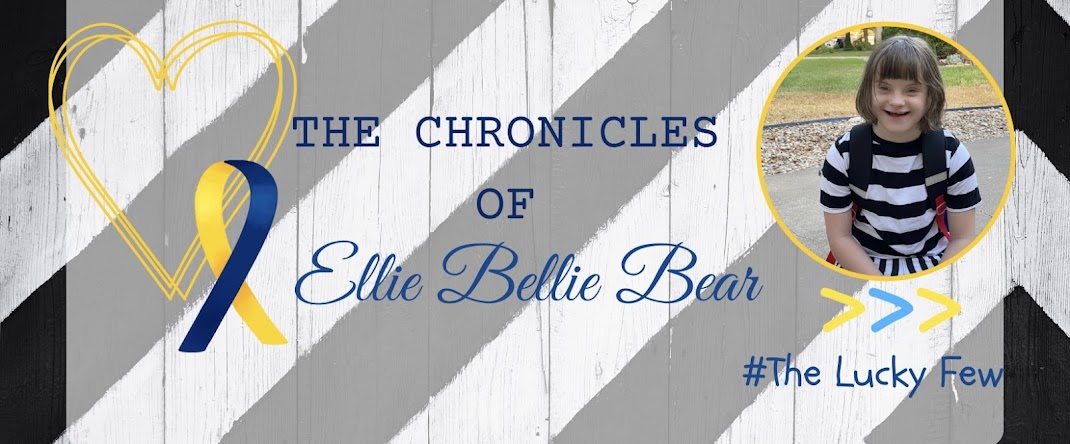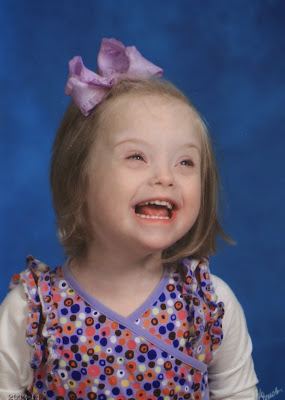*
This is a continuation of the post I wrote last week about SPD and ADHD being the pits. I really wanted to title this post "ADHD Sucks!" given my state of mind lately. I promise more uplifting posts in the future*
About 65% of the week, my day ends in tears. My tears and Ellie's tears. I want to check out at about 6pm. When Andrew gets home. The day has been a long battle where there are no clear winners. Not that there is a competition going on or anything. A battle to survive the day, perhaps?
The other 45% of the time, I feel like I imagined those horrible, trying days. I see what can and should be. How wonderful, smart, and kind my daughter is. What she is capable of. Her infinite amount of potential.
My little girl is ruled by hyperactivity, lack of impulse control, a nonexistent attention span, and sensory seeking behaviors. All classic hallmarks of ADHD and
sensory processing disorder. These acronyms were suspected back when Ellie was just 22 months old and later confirmed 1 month shy of her 3rd birthday by
more than one health care professional.
To say that she is consumed is an understatement. What looks like bad parenting to the casual observer are actually carefully enacted behavior therapy tactics and a frazzled mother trying to keep her sh*t together. When what a really want to do is throw myself on the floor and kick and cry and scream.
It is not her fault.
I thought that I understood ADHD, but I did not. Not until Ellie came along. The signs of ADHD were there before she started to walk. My little spider monkey was actually trying to climb before walking. I didn't really think ADHD was a big deal. I thought, yeah, kids with lots of energy. Let them run around outside to wear them out. They are
never worn out. Then I saw this disorder driving my daughter. My child is consumed and it is affecting her ability to socialize, learn, and even talk.
I worry about Ellie. I worry that I cannot help her.
One of Ellie's goals in school is to sit in circle time in her chair for 10 seconds. TEN seconds. She is 4 years-old and only 10 seconds. Without stealing another child's chair. And it is DIFFICULT for her. Following directions is a near impossible feat. She hears only part of the command and is then distracted or she hears the entire command and then gets distracted while trying to follow it. It can take 15 minutes to put her shoes on because I have to constantly redirect her from the toy laying on the floor, the piece of lint under the table, or all the other shoes on the bench. There are times where she actually gets one shoe on, but is so distracted that she starts wondering around without putting on the second shoe. Getting dressed is like completing an obstacle course blindfolded.
She has a hard time using the iPad. She cannot wait for an app to load or a YouTube video to come on without swiping the screen of the iPad. Then she is agitated and frustrated because she didn't get to use her app or see the video. Sadly, the iPad is thrown across the room. Happily, the Otterbox case is a great product. Or my personal embarrassing favorite, the walking through a restaurant and Ellie impulsively decides to grab a drink off the table and dump it on the ground.
Don't even get me into the climbing. The crazed climbing with no focus. This is not climbing to get to an object, but rather climbing because she her little brain tells her that she
has to. No matter how much she climbs, it is never enough. Try paying attention in school or playing with a friend when your body is screaming at you to climb.
One of the first things we tried, without success, was a gluten-free, dairy-free diet. We have tried various sensory exercises. Some of which partially help like brushing, swinging (one of those swings that completely encloses you--in therapy only as those bad boys cost $200), and deep compressions.
Heavy work occasionally helps. Others that did nothing included SPIO vest, weighted vests/blankets, sitting on a bumpy disk. We use a lot of positive reinforcement and pictures for sitting for small periods and a lot of first:then--first sit on potty, then you get juice. Or first x therapy, then you get baby doll. Time outs do nothing. Other things we tried can be found here at
sensory ideas for the home. For those of you who live near Austin, I can give you details about every park and indoor play scape in a 15 mile radius because I would take her to these play-scapes before therapies to help her focus. Ellie is the energizer bunny. She keeps going and going and going. (This mama bear could use some D-cell batteries for herself because coffee just isn't cutting it!)
I kept hoping this was temporary. Like the terrible 2s or 3s or even 4s. That as she matured developmentally, it would just disappear.
It is not a phase.
When Ellie first showed signs of SPD and ADHD, she was evaluated by a developmental pediatrician. Her regular pediatrician referred us because "I have never seen a child with so much energy". Our developmental pedi (who was floored by Ellie's endless energy and her ability to move and exam room table) recommended various sensory exercises and ABA therapy (behavioral therapy). In many cases, preschool-aged children no longer fall under the diagnosis of ADHD after 6 months of ABA therapy. We sincerely hoped that would be the case for Ellie.
ABA therapy drastically helped with her throwing triads and some of her other troublesome behaviors. She learned how to sit in a chair, follow routine directions, and I learned a lot of great parenting skills in handling her sensory issues. We still have ABA therapy once a week and whenever something comes up, I ask her awesome therapist Leslie for advice. Everyone needs a Miss Leslie to consult! Early Intervention also helped us in finding
chewy tubes and various foods that would help satisfy her oral cravings.
We did it all. A year later, things were getting better in some areas (sensory) and worse in others (impulsivity and attention and CLIMBING). At this point, Ellie was almost 3 years-old and was evaluated by the school system. They were afraid to put her in the typical special eduction placement. I would call the developmental pedi office crying because I felt that I couldn't keep Ellie safe! I couldn't leave her alone. When I used the bathroom, I would take her in with me, but she would be in the sink flooding our bathroom or hanging from the shower curtain! I was scared to go grocery shopping because she could climb out of the cart. I was just plain scared.
After much discussion, Ellie got some respite from her drive to climb in the form of Tenex (guanfacine). This alpha-agonist is a blood pressure medication that works in the brain. It is one of two nonstimulant medications approved for the treatment of ADHD (the other being clonidine). The caveat, there is limited efficacy and it does not work on impulsivity. Within in one week of trying the Tenex, we saw a huge difference. Bear didn't seem to be driven by a motor. She wouldn't get that glazed look in her eyes and climb just because her brain commanded her to. If she climbed, it was purposeful--to climb a playscape or climb the kitchen island to reach a forbidden item. She was able to attend a little longer to tasks. Things were not perfect, but they were better. She also slept better. The second assessment for school couldn't believe she was the same child. The therapists felt that they could make headway on helping her to communicate or develop fine motor skills instead of just running after her. I was able to read most of a board book for the first time to her. My little Ellie was still a sassy little girl full of personality, but her motor seeking behaviors had vanished.

Every few months the school, therapists, Andrew and I would notice spikes in her hyperactivity and poor attention and we would increase the dose. A few months ago, we maxed out on Tenex/guanfacine. The therapists are having trouble with her lack of attention. School writes in her daily notes that Ellie is unfocused and not responding to redirection. Her bedroom curtain rod broke in half due to her attempting a Tarzan move. We rarely go to
Quizno's (recall we went twice a week) because I cannot keep her out of the kitchen or the bathrooms let alone seated long enough to eat. She has trouble finishing meals because she is so distracted. The speech therapists believe that her lack words is related to her poor attention span. That she cannot listen to the whole word or attend to watching the therapist's mouth. Ellie is becoming more irritable and aggressive. Her brain is holding her hostage and I cannot help her.
Right now I am doing the best that I can to help my little girl. . . but what if my best isn't good enough? I love this little girl so much and I just want life to be easier for her. Why must it be some complicated?
*I wrote this post a few weeks ago. We have since done a trial of two other medications which have resulted in undesirable side effects. At this point we are are continuing with the Tenex, but trying to administer it at different times. It is helping somewhat in the afternoons. Morning are still difficult, especially before the medication kicks in.
References:
American Academy of Pediatrics ADHD Clinical Practice Guidelines. Note that there are specific sections for preschool-aged children
CDC-ADHD Recommendations.












